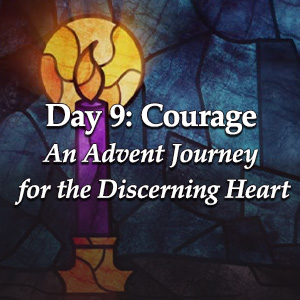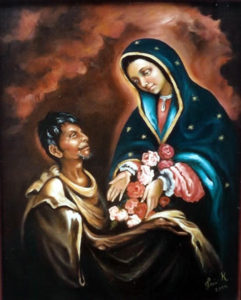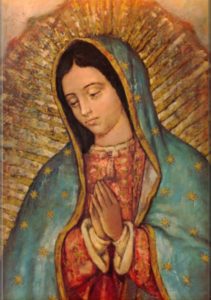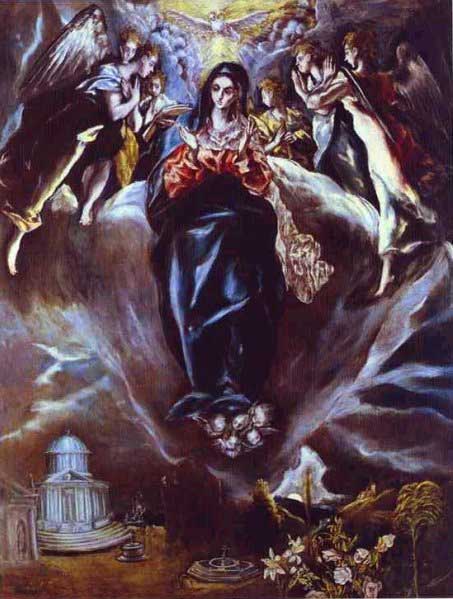Podcast: Play in new window | Download (Duration: 4:56 — 3.5MB) | Embed
Subscribe: Apple Podcasts | Spotify | Amazon Music | Android | Pandora | iHeartRadio | JioSaavn | Podchaser | Gaana | Podcast Index | Email | TuneIn | Deezer | Anghami | RSS | More
An Advent Journey for the Discerning Heart:
Prepare your heart for Christ through Scripture, the saints, and the gentle practice of daily listening.
Week Two: Following the Voice of Christ
 DAY 9 – Courage
DAY 9 – Courage
“Wait for the Lord. Be strong, and let your heart take courage. Yes, wait for the Lord.”
Psalm 27.14 RSV
Courage is the grace that strengthens the heart to follow Christ even when the path feels uncertain or overwhelming. Advent forms this courage by teaching the soul to trust God’s presence more than its own fear. Courage is not boldness. It is not confidence in ourselves. It is confidence in God.
True courage does not mean the absence of fear. It means the heart chooses faith in the midst of fear. It is the inner movement that says, “I do not see the whole way, but I will take the next step because God is with me.” Courage rises when the soul remembers that Christ has already gone ahead.
Courage is also a virtue. It is fed by grace. It grows when the heart draws strength from God rather than from its own resources. The discerning heart learns that courage is not something we manufacture. It is something we receive when we lean on the One who steadies us.
Advent reveals that Christ comes into our fear, not after it disappears. He gives courage by His nearness.
Journey with the Saints –
Pope St. John Paul II
“Do not be afraid. Open wide the doors to Christ.”
St. John Paul II, Homily at the Mass for the Inauguration of His Pontificate, 22 October 1978
St. John Paul II understood that courage is born from trust in Christ. His life bore the marks of suffering, loss, and oppression, yet his heart remained steady because it was anchored in the presence of God. His courage was not human strength. It was divine confidence.
For St. John Paul, courage begins with opening the heart to Christ. Fear narrows the heart. Courage expands it. Fear closes the doors. Courage opens them. He believed that when Christ enters the heart, grace strengthens it to face any darkness, not by removing the struggle, but by filling it with light.
He knew that the heart grows courageous when it accepts God’s love and surrenders any attempt to control outcomes. He teaches us that courage is the fruit of letting Christ stand within us.
Reflection for the Listening Heart
Today invites you to notice places of hesitation within your soul. What feels uncertain. Where do you sense resistance. Courage does not demand that you overcome fear before you move. It asks you to take one small step with Christ, trusting that He steps with you.
Courage grows when the heart remembers past moments of grace. Think of times God has been faithful to you. Think of times when you feared the path ahead but discovered His presence waiting for you. That memory strengthens courage now.
Ask yourself: Where is God asking me to take a small courageous step. How can I rely on His strength rather than my own.
A Simple Practice for Today
Take one moment today to pray slowly, “Lord, strengthen my heart.” Identify one small step of trust and take it with intention. Later in the day, repeat the prayer as a reminder that courage is a grace you receive, not a task you achieve.
Prayer
Lord Jesus, give courage to my heart. Help me trust that You are with me in every uncertainty. Strengthen me with Your grace so I may follow where You lead. Steady my fears and fill me with the confidence that comes from Your presence. Teach me to take each step with You. Amen.
For more of the episodes of
An Advent Journey for the Discerning Heart with Kris McGregor visit here
Citations for Day 9
Psalm 27.14 RSV
St. John Paul II, Homily for the Inauguration of His Pontificate, 22 October 1978
© Discerning Hearts. All rights reserved.









